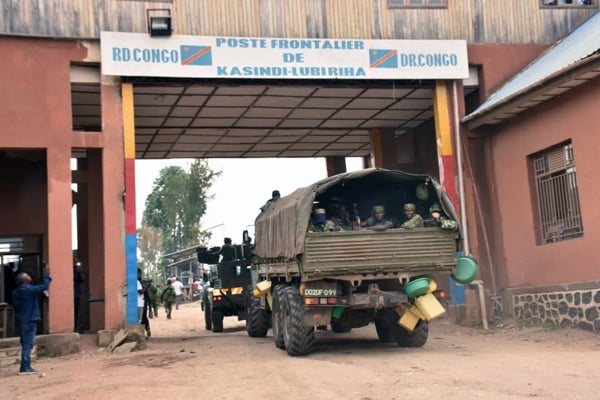Prime
Jury still out on landmark crackdown on rebels in eastern DR Congo

A soldier with the Uganda People's Defence Forces (UPDF) is seen on the Mbau-Kamango road in the Beni district on December 08, 2021. PHOTO / AFP
What you need to know:
- Kinshasa says the joint mission against the Allied Democratic Forces (ADF) -- which the so-called Islamic State describes as its affiliate -- is succeeding, even going so far as to say the rebels are "at bay".
Late last year, Ugandan and Congolese troops launched an unprecedented offensive against the deadliest militia in eastern DR Congo, but two months later, the operation's effectiveness remains unclear.
Kinshasa says the joint mission against the Allied Democratic Forces (ADF) -- which the so-called Islamic State describes as its affiliate -- is succeeding, even going so far as to say the rebels are "at bay".
But deadly attacks are continuing, both on civilians and the security forces, and for many local people, cautious goodwill is starting to fray.
In a brazen attack on Wednesday night, ADF rebels attacked a Congolese army position and police station at the border town of Nobili, where Ugandan forces cross.
Two people were shot dead and two died in a stampede as several thousand people rushed into Uganda for safety, according to a local official.
The joint offensive began early on the morning of November 30 when Ugandan aircraft and artillery pounded areas in the provinces of North Kivu and Ituri where ADF bases had been spotted.
A few hours later, troops from Kampala crossed into the Democratic Republic of Congo, in an incursion approved by and coordinated with the DRC armed forces.
Their ongoing joint operation has stirred ambivalent feelings among residents.
Many are desperate to see the end of ADF atrocities, which the DRC army has failed to stem despite a "state of siege" giving security forces exceptional powers in the two provinces.
Yet they are also leery of Uganda, whom many have accused of stoking destabilisation in the region for the past quarter of a century.
In Ituri, Jackson Akilimali, who was forced to flee his village in the Walese Vonkutu chiefdom, was initially pleased by the crackdown.
"At first, we really liked the idea of forces being pooled," said the young man, who is sheltering temporarily with a family in the city of Komanda.
"But so far, I haven't seen any Ugandan soldiers around here, and... civilians are still being killed," he told AFP.
Late on January 24, more than a dozen people died in an attack blamed on the ADF.
Kasuta Mulemberi, from the Ituri village of Luna, was disappointed as well, saying: "They said they were going to hunt down the rebels, but we haven't seen anything on the ground since then."
Forest shelling
"It's sad, but we still have hope," Dieudonne Malangay, a civil society leader in Walese Vonkutu, said last week.
"We want the Ugandan forces also to step up operations on the Ituri side" with the Congolese army.
In the neighbouring province of North Kivu, residents of the Beni region who have been hard hit by the ADF's abuses also expressed frustration.
"There are Ugandan troops movements on the road," said rights activist David Moaze.
"We hear shelling deep inside the park and in the forests,” he said, referring to the Virunga reserve famous for its endangered mountain gorillas.
"But to say that there are significant advances is not true," Moaze said.
Displaced villagers still cannot return home or cultivate their fields, he said.
Shortly after their arrival in the DRC, the Ugandan soldiers -- whose number remains unknown -- got to work rebuilding sections of road, using machinery that they brought in.
Roadwork has also begun in other areas.
Kambale Kasombolwa, a taxi driver, said that while part of the road has been secured, one section remains "a nightmare."
He said some taxi drivers had been killed on the road since the joint operations began.
Rising toll
In addition to the Congolese-Ugandan operation, the UN peacekeeping force in the DRC, MONUSCO, is present in the region.
Commanders of the three forces met on January 22 to discuss coordination.
Antony Mualushayi, spokesman for the Congolese army in the Beni region, said, "The main thing is to know who does what and in which area precisely."
And yet "the number of dead is still rising," Darius Syahera, a representative of civil societe in Beni, North Kivu, said angrily.
The DRC army is officially upbeat about the two-month-old joint operation.
Its spokesman in Ituri, Lieutenant Jules Ngongo, said "the assessment... is broadly positive."
He said the forces had arrested and detained "outlaws," crimping "their ability to make trouble".
On January 12, the two armies announced the arrest of one of the founders of the ADF, and late last week a "jihadist" was captured who was wanted by Kenya and linked to the ADF.
General Sylvain Ekenge, spokesman for the military governor of North Kivu, said Monday that other rebels had been killed in fighting.
Since late November, the army has taken control of some ADF strongholds, leaving the rebels "at bay and roaming around", he said.




